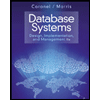
Fundamentals of Information Systems
9th Edition
ISBN: 9781337097536
Author: Ralph Stair, George Reynolds
Publisher: Cengage Learning
expand_more
expand_more
format_list_bulleted
Concept explainers
Question
thumb_up100%
Chapter 3, Problem 7DQ
Program Plan Intro
Check out three organizations Federal Internal Revenue services, Bureau of Motor Vehicles and Equifax and answer following questions:
- How does these organizations capture data for
database ? - Can we get printout of the content of our record?
- Is it possible to correct error in the data record?
- What are the data privacy concerns with these organizations?
Expert Solution & Answer
Trending nowThis is a popular solution!

Students have asked these similar questions
this module is human computer interaction 700. answer all correctly .
QUESTION ONE 1.1 Define interaction design and explain its significance in modern technology. 1.2 Differentiate between good and poor design by providing two examples. 1.3 Explain how digital transformation has changed human interactions with technology. 1.4 What are the key considerations when designing an interactive product? (30 MARKS) (5 Marks) (5 Marks) (5 Marks) (5 Marks) 1.5 What are the essential characteristics of good designing. Identify and describe how these are important standards for designing (10 Marks) QUESTION TWO (30 MARKS) 2.1 What are conceptual models in interaction design?…
Subject: Computer databases please show all the work, draw the ER diagram
Subject: Computer databases please show all the work, draw the ER diagram
Chapter 3 Solutions
Fundamentals of Information Systems
Ch. 3 - Prob. 1LOCh. 3 - Prob. 2LOCh. 3 - Prob. 3LOCh. 3 - Prob. 4LOCh. 3 - Prob. 5LOCh. 3 - Define the role of the database schema, data...Ch. 3 - Prob. 7LOCh. 3 - Prob. 8LOCh. 3 - Prob. 9LOCh. 3 - Prob. 10LO
Ch. 3 - Prob. 11LOCh. 3 - Prob. 12LOCh. 3 - Prob. 13LOCh. 3 - Explain how a NoSOL database is different from an...Ch. 3 - Prob. 15LOCh. 3 - Prob. 16LOCh. 3 - Prob. 1.1RQCh. 3 - Which attribute would you designate as the primary...Ch. 3 - Prob. 1.1CTQCh. 3 - Prob. 1.2CTQCh. 3 - Prob. 2.1RQCh. 3 - Prob. 2.2RQCh. 3 - Prob. 2.1CTQCh. 3 - Prob. 2.2CTQCh. 3 - Prob. 3.1RQCh. 3 - Prob. 3.2RQCh. 3 - What additional questions need to be answered...Ch. 3 - Prob. 3.2CTQCh. 3 - Prob. 4.1RQCh. 3 - Prob. 4.2RQCh. 3 - Prob. 4.1CTQCh. 3 - Prob. 4.2CTQCh. 3 - Prob. 5.1RQCh. 3 - Prob. 5.2RQCh. 3 - Why is it unlikely that a traditional SQL database...Ch. 3 - Prob. 5.2CTQCh. 3 - Prob. 1SATCh. 3 - Prob. 2SATCh. 3 - Prob. 3SATCh. 3 - Prob. 4SATCh. 3 - The ability to combine two or more tables through...Ch. 3 - Prob. 6SATCh. 3 - Prob. 7SATCh. 3 - Prob. 8SATCh. 3 - Prob. 9SATCh. 3 - Prob. 10SATCh. 3 - Prob. 11SATCh. 3 - Prob. 12SATCh. 3 - Prob. 13SATCh. 3 - Prob. 14SATCh. 3 - Prob. 15SATCh. 3 - Prob. 16SATCh. 3 - Prob. 1RQCh. 3 - In the hierarchy of data, what is the difference...Ch. 3 - Prob. 3RQCh. 3 - What is meant by data archiving? Why is this an...Ch. 3 - What is an entity-relationship diagram, and what...Ch. 3 - Identify four basic data manipulations performed...Ch. 3 - Prob. 7RQCh. 3 - Prob. 8RQCh. 3 - Prob. 9RQCh. 3 - Prob. 10RQCh. 3 - Prob. 11RQCh. 3 - Prob. 12RQCh. 3 - Prob. 13RQCh. 3 - Prob. 14RQCh. 3 - Prob. 15RQCh. 3 - Prob. 16RQCh. 3 - Prob. 17RQCh. 3 - Prob. 1DQCh. 3 - Outline some specific steps an organization might...Ch. 3 - SQL databases conform to ACID properties. Briefly...Ch. 3 - Prob. 4DQCh. 3 - Prob. 5DQCh. 3 - Prob. 6DQCh. 3 - Prob. 7DQCh. 3 - Prob. 8DQCh. 3 - Prob. 9DQCh. 3 - Prob. 1PSECh. 3 - A company that provides a movie-streaming...Ch. 3 - Prob. 3PSECh. 3 - Prob. 4PSECh. 3 - Prob. 1WECh. 3 - Prob. 2WECh. 3 - Prob. 3WECh. 3 - Describe the role of a database administrator....Ch. 3 - Prob. 2CECh. 3 - Prob. 1.1CSCh. 3 - Prob. 1.2CSCh. 3 - Prob. 1.3CSCh. 3 - Prob. 2.1CSCh. 3 - Prob. 2.2CSCh. 3 - Prob. 2.3CS
Knowledge Booster
Learn more about
Need a deep-dive on the concept behind this application? Look no further. Learn more about this topic, computer-science and related others by exploring similar questions and additional content below.Similar questions
- please show all the work, draw the ER diagramarrow_forwardmodule : java q1 and q2 in image Question3: (30 MARKS) Passenger Rail Agency for South Africa Train Scheduling System Problem Statement Design and implement a train scheduling system for Prasa railway network. The system should handle the following functionalities: 1. Scheduling trains: Allow the addition of train schedules, ensuring that no two trains use the same platform at the same time at any station. 2. Dynamic updates: Enable adding new train schedules and canceling existing ones. 3. Real-time simulation: Use multithreading to simulate the operation of trains (e.g., arriving, departing). 4. Data management: Use ArrayList to manage train schedules and platform assignments. Requirements 1. Add Train Schedule, Cancel Scheduled Train, View Train Schedules and Platform Management 2. Concurrency Handling with Multithreading i.e Use threads to…arrow_forwardmodule : java Question 1: (40 MARKS) E-Hailing Bicycle Management System Case Study:An e-hailing company that rents out bicycles needs a system to manage its bicycles, users, and borrowing process. Each user can borrow up to 2 bicycles at a time, specifically for families with children 18 years or below. The system must track the bicycles (name, make, type, and availability) and users (name, ID, and borrowed bicycles). The company also wants to ensure that the system uses a multidimensional array to store information about the bicycles. Requirements: Add and View Bicycles: Borrow Bicycles: Return Bicycles Display Borrowed Bicycles and Search for a bicycle Create a menu-driven program to implement the above. Sample Output: Add Bicycle View All Bicycles Borrow Bicycle Return Bicycle View Borrowed Bicycles Search Bicycle ExitEnter your choice:arrow_forward
- this module is java 371. please answer all questions correctly , include all comments etc and follow all requirements. Question 1: (40 MARKS) E-Hailing Bicycle Management System Case Study:An e-hailing company that rents out bicycles needs a system to manage its bicycles, users, and borrowing process. Each user can borrow up to 2 bicycles at a time, specifically for families with children 18 years or below. The system must track the bicycles (name, make, type, and availability) and users (name, ID, and borrowed bicycles). The company also wants to ensure that the system uses a multidimensional array to store information about the bicycles. Requirements: Add and View Bicycles: Borrow Bicycles: Return Bicycles Display Borrowed Bicycles and Search for a bicycle Create a menu-driven program to implement the above. Sample Output: Add Bicycle View All Bicycles Borrow Bicycle Return Bicycle View Borrowed Bicycles Search Bicycle ExitEnter your choice: Question 2…arrow_forwardthis module is java 371. please answer all questions correctly , include all comments etc and follow all requirements. Question 1: (40 MARKS) E-Hailing Bicycle Management System Case Study:An e-hailing company that rents out bicycles needs a system to manage its bicycles, users, and borrowing process. Each user can borrow up to 2 bicycles at a time, specifically for families with children 18 years or below. The system must track the bicycles (name, make, type, and availability) and users (name, ID, and borrowed bicycles). The company also wants to ensure that the system uses a multidimensional array to store information about the bicycles. Requirements: Add and View Bicycles: Borrow Bicycles: Return Bicycles Display Borrowed Bicycles and Search for a bicycle Create a menu-driven program to implement the above. Sample Output: Add Bicycle View All Bicycles Borrow Bicycle Return Bicycle View Borrowed Bicycles Search Bicycle ExitEnter your choice: Question 2…arrow_forwardwhat are some available cloud components, types, delivery models, and configurations in web services and cloud computing? thanksarrow_forward
- I would like to get information to know features about the following concepts: 1. Anything as a Server (XaaS) 2. Block Storage 3. WebSocketarrow_forwardPlease answer JAVA OOP problem below: You are working at a university that tracks students. Each student is identified by their name and faculty advisor. Each faculty advisor is identified by their name, department, and maximum number of students they can advise. Using solid OO design principles, create a modular program that implements all the classes for the problem and also creates an implementation class that gathers user input for one student and then prints out the information gathered by creating the appropriate data definition and implementation classes. All data must be validated. I have given the code so far: Implementation: import javax.swing.JOptionPane; public class Implementation { public static void main(String[] args) { FacultyAdvisor facultyAdvisor = new FacultyAdvisor("Sharmin Sultana", "IT", 30); Student student = new Student("John", facultyAdvisor); JOptionPane.showMessageDialog(null, student.toString()); } } Student: public…arrow_forwardExercise 1 Function and Structure [30 pts] Please debug the following program and answer the following questions. There is a cycle in a linked list if some node in the list can be reached again by continuously following the next pointer. #include typedef struct node { int value; struct node *next; } node; int 11_has_cycle (node *first) if (first == node *head { NULL) return 0;B = first; while (head->next != NULL) { if (head == first) { return 1; } head head->next; } return 0; void test_11_has_cycle() { int i; node nodes [6]; for (i = 0; i < 6; i++) nodes [i] .next = NULL; nodes [i].value i; } nodes [0] .next = &nodes [1]; nodes [1] .next = &nodes [2]; nodes [2] .next = &nodes [3]; nodes [3] .next = & nodes [4]; nodes [4] .next = NULL; nodes [5] .next = &nodes [0]; printf("1. Checking first list for cycles. \n Function 11_has_cycle says it hass cycle\n\n", 11_has_cycle (&nodes [0]) ?"a":"no"); printf("2. Checking length-zero list for cycles. \n Function 11_has_cycle says it has %s…arrow_forward
arrow_back_ios
SEE MORE QUESTIONS
arrow_forward_ios
Recommended textbooks for you
 Fundamentals of Information SystemsComputer ScienceISBN:9781337097536Author:Ralph Stair, George ReynoldsPublisher:Cengage Learning
Fundamentals of Information SystemsComputer ScienceISBN:9781337097536Author:Ralph Stair, George ReynoldsPublisher:Cengage Learning Principles of Information Systems (MindTap Course...Computer ScienceISBN:9781305971776Author:Ralph Stair, George ReynoldsPublisher:Cengage Learning
Principles of Information Systems (MindTap Course...Computer ScienceISBN:9781305971776Author:Ralph Stair, George ReynoldsPublisher:Cengage Learning
 Database Systems: Design, Implementation, & Manag...Computer ScienceISBN:9781305627482Author:Carlos Coronel, Steven MorrisPublisher:Cengage Learning
Database Systems: Design, Implementation, & Manag...Computer ScienceISBN:9781305627482Author:Carlos Coronel, Steven MorrisPublisher:Cengage Learning Database Systems: Design, Implementation, & Manag...Computer ScienceISBN:9781285196145Author:Steven, Steven Morris, Carlos Coronel, Carlos, Coronel, Carlos; Morris, Carlos Coronel and Steven Morris, Carlos Coronel; Steven Morris, Steven Morris; Carlos CoronelPublisher:Cengage Learning
Database Systems: Design, Implementation, & Manag...Computer ScienceISBN:9781285196145Author:Steven, Steven Morris, Carlos Coronel, Carlos, Coronel, Carlos; Morris, Carlos Coronel and Steven Morris, Carlos Coronel; Steven Morris, Steven Morris; Carlos CoronelPublisher:Cengage Learning

Fundamentals of Information Systems
Computer Science
ISBN:9781337097536
Author:Ralph Stair, George Reynolds
Publisher:Cengage Learning

Principles of Information Systems (MindTap Course...
Computer Science
ISBN:9781305971776
Author:Ralph Stair, George Reynolds
Publisher:Cengage Learning



Database Systems: Design, Implementation, & Manag...
Computer Science
ISBN:9781305627482
Author:Carlos Coronel, Steven Morris
Publisher:Cengage Learning

Database Systems: Design, Implementation, & Manag...
Computer Science
ISBN:9781285196145
Author:Steven, Steven Morris, Carlos Coronel, Carlos, Coronel, Carlos; Morris, Carlos Coronel and Steven Morris, Carlos Coronel; Steven Morris, Steven Morris; Carlos Coronel
Publisher:Cengage Learning